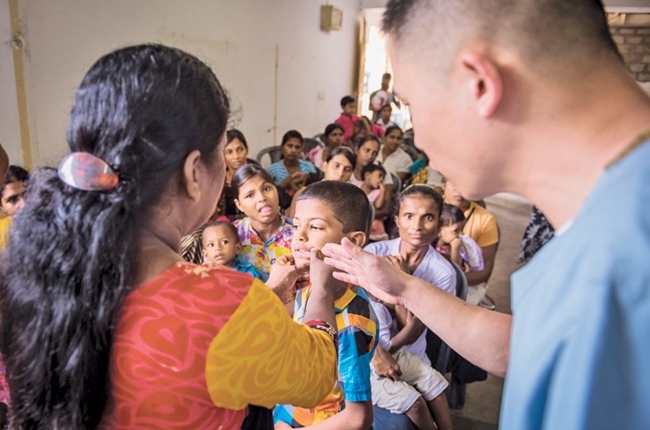Measles, a highly contagious and potentially life-threatening infection, is primarily transmitted through the air via tiny droplets released during coughing and sneezing. This viral illness can give rise to severe complications and even lead to fatalities. However, its impact can be significantly mitigated through preventive measures, with vaccination being the most crucial aspect of prevention. Prompt notification and reporting of suspected cases are paramount for early detection and control of potential outbreaks, preventing further spread and safeguarding vulnerable populations.
 Before the introduction of the measles vaccine in 1963 and widespread vaccination, major epidemics occurred approximately every two to three years and caused an estimated 2.6 million deaths each year.
Before the introduction of the measles vaccine in 1963 and widespread vaccination, major epidemics occurred approximately every two to three years and caused an estimated 2.6 million deaths each year.
An estimated 128 000 people died from measles in 2021 – mostly children aged under 5, despite the availability of a safe and cost-effective vaccine.
Measles is caused by a virus in the paramyxovirus family and is normally passed through direct contact and the air. The virus infects the respiratory tract, and then spreads throughout the body, causing severe disease, complications and even death.
Pandemic effects
The Covid 19 pandemic led to setbacks in surveillance and immunisation efforts. The suspensions of immunisation services and declines in immunisation rates and surveillance across the globe left millions of children vulnerable to preventable diseases like measles.
No country is exempt from measles, and areas with low immunisation encourage the virus to circulate, increasing the likelihood of outbreaks and putting all unvaccinated children at risk.
Signs and symptoms
The first sign of measles is usually a high fever, beginning about 10-14 days after exposure to the virus and lasting four-seven days.
A runny nose, cough, red and watery eyes, and small white spots inside the cheeks can develop in the initial stage. A rash erupts after several days, usually on the face and upper neck. The rash spreads over about three days, eventually reaching the hands and feet, and lasts five to six days before fading. On average, the rash occurs 14 days after exposure to the virus (within a range of seven to 18 days).
Most measles-related deaths are caused by disease-related complications. Serious complications are more common in children under five years, or adults over 30 years of age. The most serious complications include blindness, encephalitis (an infection that causes brain swelling), severe diarrhoea and related dehydration, ear infections, or severe respiratory infections such as pneumonia. Severe measles is more likely among malnourished young children, especially those with insufficient vitamin A or weakened immune systems.
Who is at risk?
Any non-immune person (not vaccinated or vaccinated but did not develop immunity) can become infected. Unvaccinated young children and pregnant persons are at highest risk of severe measles complications.
Measles is still common, particularly in parts of Africa and Asia. The overwhelming majority of measles deaths occur in countries with low per capita incomes or weak health infrastructures that struggle to reach all children with immunisation.
Transmission
Measles is one of the world’s most contagious diseases, spread by close or direct contact with infected nasal or throat secretions (coughing or sneezing). One person infected by measles can infect nine out of 10 of their unvaccinated close contacts.
The virus remains active and contagious in the air or on infected surfaces for up to two hours. It can be transmitted by an infected person from four days prior to the onset of the rash to four days after the rash erupts.
Measles outbreaks can result in severe complications and deaths, especially among young, malnourished children. In countries close to measles elimination, cases imported from other countries remain an important source of infection.
Treatment
No specific antiviral treatment exists for measles.
Severe complications from measles can be reduced through supportive care with good nutrition, adequate fluid intake and dehydration treatment with WHO-recommended oral rehydration solution, which replaces fluids and essential elements lost through diarrhoea or vomiting. Antibiotics should be prescribed to treat eye and ear infections, and pneumonia.
Prevention
Routine measles vaccination, combined with mass immunisation campaigns in countries with high case rates is crucial for reducing global measles deaths. The measles vaccine – in use for about 60 years – is safe, effective and inexpensive.
The measles vaccine is often incorporated with rubella and/or mumps vaccines. It is equally safe and effective in the single or combined form.
Check whether your child has received a complete course of measles vaccine. If not immediately contact your MoH office or public health person in your area.
Dr Jude Jayamaha




